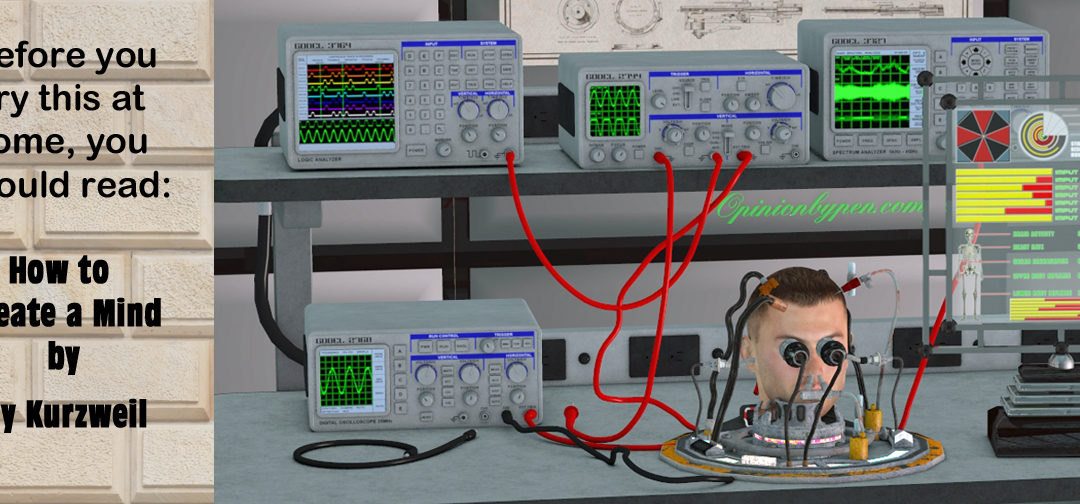I bought How to Create a Mind by Ray Kurzweil because Audible put it on sale the same day I had an argument animated discussion with a co-worker about Artificial Intelligence. Knowing I was right, I bought the book to provide supporting material for my position. While the book did support my argument, just barely, my victory was largely Pyrrhic because the book also showed me how very little I actually knew about AI and how my brain works.
I spend approximately ninety minutes a day commuting between home and office. I used to spend that time listening to the radio and catching up with the news. Sadly, I find most of the news poorly reported, biased and depressing. When I discovered I could play my Audiobooks through my cars audio system, listening to the radio became a thing of the past.
The audiobook version of How to Create a Mind is slightly over ten hours long, giving me almost five days of listening amazement (okay, I cheated a little, several times). A slight caution here, my supervisor was not understanding when I had to explain I was late because I was sitting in the parking lot trying to finish the chapter.
The book confirmed that I had been correct in my discussion, at least I chose to interpret it that way. As I continued listening, I realized the fact that I had once successfully implemented a neural net for decision making in one of my programs was almost as remarkable as primitive man striking a match after being given instructions on how to do so.
Don’t get me wrong, the book is not full of deep algorithms giving you step by step instructions on implementing your own version of Siri. Instead it gives you a deeper understanding on how you think and how current trends in AI are trying to implement and supplement the way your mind works.
Yeah, I already had the same thoughts but consider this, we’ve already surrendered our ability to do math to our calculators. Any idea what your best friend’s phone number is? No fair looking at your contacts list. It’s just another example where we’re outsourcing technology to supplement our capabilities.
Still not ready to go out and have a data port implanted in your brain? How about an implant that can help improve your memory? Check out this story on an implant to help Alzheimer’s victims. Yes, it’s a few years off but a quick Google of the subject shows you that several research teams are studying and making progress in this field.
Mr. Kurzweil takes the time to make the book interesting while giving you just enough theory to allow you to understand and appreciate the book. Having finished the book, I found myself amazed by our progress and intrigued by the state of the technology.
The book is not without flaw, Mr. Kurzweil comes across as a high priest of AI and he spends much of the book defending his theories and predictions. The amazing thing is that more often than not, I found myself agreeing with him. What I did not know when I bought the book was that he was one of the creative minds behind Dragon Naturally Speaking. A very impressive program in its own right.
He gave several simple thought experiments that demonstrated his theories and cited theories and predictions from his previous books. He was able to claim over 70% success on over 200 predictions. I can only wish I could do that well at the stock market. When he analyzed the predictions and gave himself credit for the ones he had missed by only a few years, his success ratio jumped to over 90%. Nostradamus, eat your heart out.
To say I was greatly saddened when the book came to an end would be an understatement. I wanted more.
One final word. Way too often the author will decide he’s the best person to do the narration. I’ll agree that the author usually knows the subject matter far better than anyone else but seldom does he understand just how important the narrator is to quality of the performance. I have a number of audiobooks in my library where the author decided to do the narrative himself and completely destroyed the quality of the reading.
In How to Create a Mind, Ray Kurzweil uses a professional voice actor that gave just the right blend between scientific narrative and entertainment.
If you’re going to live in a world of Siri, Alexa, Cortana and Watson, you owe it to yourself to read or listen to How to Create a Mind. You’ll never see our world in the same light again.
© 2016 – 2019, Byron Seastrunk. All rights reserved.











Recent Comments